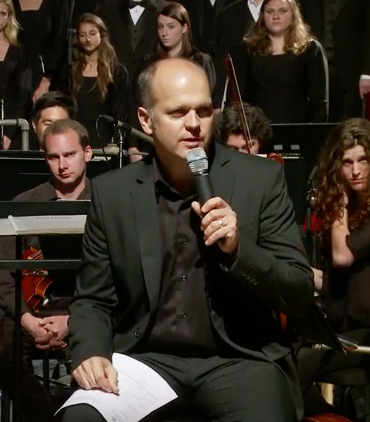Pepperdine Music Professor N. Lincoln Hanks Composes Cantata Inspired by Poetry of Dietrich Bonhoeffer
 It was in 2004 when Pepperdine University professor of music
N. Lincoln Hanks
was first introduced by a Christian friend to the life of Dietrich Bonhoeffer, the
German minister and Confessing Church founder whose poetic writings deeply inspired
Hanks to compose a dramatic cantata that took over a decade to complete.
It was in 2004 when Pepperdine University professor of music
N. Lincoln Hanks
was first introduced by a Christian friend to the life of Dietrich Bonhoeffer, the
German minister and Confessing Church founder whose poetic writings deeply inspired
Hanks to compose a dramatic cantata that took over a decade to complete.
“I feel very connected to Bonhoeffer,” Hanks admits. “I feel incredibly inspired by his faithfulness and his patience, and the way that he faced death was so peaceful and amazing,” he adds, referring to Bonhoeffer’s final moments of prayer immediately before his execution.
While Hanks’ initial idea was to develop this story into an opera, a musical style often associated with tragedy, his research about the martyr’s life led him to realize that this story was actually one of triumph rather than grief. As he explains, “If you really believe in the afterlife, believe in God, and believe in how faith can transform all the things going on around you, it’s not a tragic story.” This required revisions to the composition, which Hanks accomplished by writing an additional three minutes of music that directs the orchestra to end the score dramatically and climactically after an intense buildup.
His dedication for this project was nationally recognized in 2010, when his cantata, “Tegel Passion,” was awarded as a finalist in the Arlin G. Meyer Prize in Musical Performance competition through the Lilly Fellows Program.
In October 2014, “Tegel Passion” was performed at a Christian composition convention at Biola University in La Mirada, California. The performance involved the combined talents of the Pepperdine Chamber Choir, the Pepperdine University Orchestra, and a professional tenor soloist hired by Hanks. For added dramatic effect, images of Bonhoeffer and footage of World War II were projected on a screen behind the musicians as they performed the piece. This collaboration also includes the efforts of recording engineer Randy Coppinger, who edited and mixed recordings of the Biola performance in early 2015.
Ryan Board, Pepperdine director of choral activities who prepared the choir for this performance, explains that “The themes of Dietrich Bonhoeffer’s life and his martyrdom are sometimes deep, and sometimes poetic and morose. The music dramatically went along with those themes—all the themes he struggled with. The music ends with the moment of his death, and it’s very dramatic.”
Board also remembers the audience’s response throughout the performance. “This was done for a chapel, with 1000+ students, some of whom have no connection to classical music. We all wondered the average listener be able to make a connection. And the great thing was, we got to the end, and they roared. They thought it was amazing.”
Jared Chance Taylor, a Pepperdine student composer involved in the Biola performance, shares that, “As someone who has read some Bonhoeffer, I found performing ‘Tegel Passion’ incredibly enriching, not only as a musician. Hanks’ orchestration, harmonic language, and dramatic choices successfully reflect both the psychology and spiritual transcendence characteristic of a twentieth-century martyr.”
Dyer Bowers, a Pepperdine music performance major who played the violin for this production, adds that “To compose such a piece takes hours of dedication, and extensive knowledge of music. The performance of ‘Tegel Passion’ was an accomplishment for both students and Dr. Hanks, and I was honored to be a part of it.”
Hanks also remains impressed with the concerted performance at Biola, expressing, “It was such a great project with a faculty composer, Dr. Board, the choir, and the orchestra. It was a huge part of our program that was on the stage and doing the recording, so I think it’s a great representation of who we are at Pepperdine.”
For a full listing of the cantata’s playlist, and to listen to the concert, visit the Pepperdine University YouTube page.